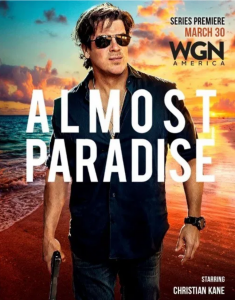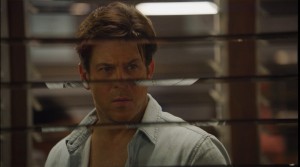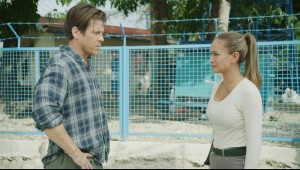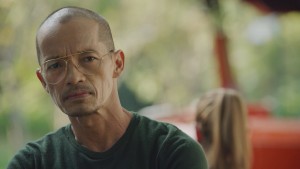ALMOST PARADISE, Monday nights on WGN America and thereafter available on Amazon, is the first American-made TV series to be shot entirely in the Philippines. Created by Dean Devlin and Gary Rosen, the series stars Christian Kane as former U.S. DEA agent Alex Walker. Alex has moved to the island of Cebu in search of a peaceful retirement, but his crime-stopping instincts keep involving him with the local police department, primarily detectives Kai Mendoza (Samantha Richelle) and Ernesto Alamares (Arthur Acun͂a).
Kerry Glover scripted the ALMOST PARADISE episode “Unbecalming,” where the police station is taken over by criminals at the same time a typhoon hits the island, and Alex has to break into the building to rescue his friends. She is also part of the series’ writing staff.
Glover was born in San Francisco and raised around the world as part of a military family. She has worked with ALMOST PARADISE executive producer Devlin and his Electric Entertainment company numerous times in the past. She scripted the LEVERAGE episode “The Lonely Hearts Job” and served as an associate producer on that the series.
In a phone conversation, Glover discusses her work on ALMOST PARADISE and more.
ASSIGNMENT X: Was LEVERAGE your first job with Dean Devlin?
KERRY GLOVER: Yes. First season was the first time Dean had produced as a series as an independent studio. He was building up Electric Entertainment, and he hired John Rogers and Chris Downey, who created LEVERAGE for him, and they started staffing up the writers. I worked on all seventy-six episodes [as script coordinator and then associate producer] after the pilot. I kept pitching every year, and got a script to write the fourth year.
AX: How did you meet Dean Devlin?
GLOVER: I formally met on him LEVERAGE, but I had actually met him years ago, back in the ‘80s. I was in an improv group, and a couple of his friends at the time introduced me to this guy, Dean Devlin, who was an actor. I later met him again when Electric was doing FLYBOYS press at San Diego Comic-Con and I was writing for Impact Magazine. I remember meeting him and [visual effects producer] Mark Franco and a bunch of other people that are still at the studio now.
AX: You worked on the entirety of FROM DUSK TILL DAWN: THE SERIES. Do you know if the way they ended it was meant to leave it open for Season 4, or was that something they did once they knew they weren’t getting a pickup?
GLOVER: You never know you’re not getting a pickup until after [the season ends]. I think that last season, they wrote all ten episodes before we even started production. Usually, for cable, you don’t find out about a pickup until after all of the episodes have aired and they look at everything. So that was a strange situation, where during the first season, it was all Troublemaker Studios and Robert Rodriguez [who co-created El Rey, the network FROM DUSK TILL DAWN: THE SERIES aired on], and then Miramax came in the second season as a financial partner, and then third season, Robert Rodriguez went off to do SIN CITY 2, and Miramax was totally the studio at that point. The short answer is no. It was written like any good TV show should be. It should be a good season-ender, but it also should be a good series-ender, just in case [laughs].
With LEVERAGE, which had five seasons, TNT was just starting to do their own original series. They had a few other shows – THE CLOSER and DARK BLUE – and they were hiring other studios to make them. But with every season, TNT started pulling all of their stuff in-house, meaning that they started being a studio, not just a network. So then, for a long time, as was the case with both Dean Devlin and Robert Rodriguez, it was really unique for them to build their own independent studios. There are more and more, now that we’ve got so many streaming outlets, but at the time, you had the big studios, you had Sony, and you had Paramount, but you didn’t really have independent studios.
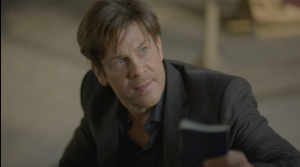 AX: When did you come onto ALMOST PARADISE?
AX: When did you come onto ALMOST PARADISE?
GLOVER: With ALMOST PARADISE, I was [around during the writing of the pilot script], which was several years ago. Dean and Gary had written it originally to take place in Hawaii. It was fun to see it evolve, because when it got set in the Philippines, a lot of things clicked for Dean. It was like it found its home from a story perspective, before we even got there [as a physical production].
AX: Does it help in story terms that the Philippines is a separate nation, so when the American government comes in in the form of the DEA or other agencies, they don’t have the authority that they would in Hawaii?
GLOVER: No, not really. Because [if it was set on American soil], then it would have just been a state versus federal kind of thing. It’s more just the feel of it, and Dean tapping into some of his roots.
AX: How did the ALMOST PARADISE writers’ room work?
GLOVER: There were several of us that were staff writers. Calvin Sloan, who wrote the fourth and the ninth episodes, and then Ty Freer and Nick Keetch – they’re a great team – they wrote number 3 and number 8.
Our writers’ room time was relatively short. We just kept it going for a couple months. And then people were staggered, as often happens – once you’ve written your episode, you stagger off of it. I wrote the middle episode. I was only ever going to do one. I think Gary might have been on the docket to write more and he gave up one. That was very generous of him, and I will forever be grateful.
AX: Did you come up with the story for “Unbecalming”? Sometimes when there’s a writers’ room, they’ve got all the stories, and the actual script is assigned to a particular writer, and sometimes the particular writer comes up with the premise for a specific episode.
GLOVER: In this case, it was a combination of both. Because the pilot itself had been written so long ago, and they had rewritten it, Calvin Sloan and Gary Rosen and Dean had been talking for a long time about episodes and things that they wanted to see and do. So when we started the writers’ room for real, there were a bunch of things that were on the board. We also pitched a bunch of things. Dean, of course, is the one who makes the decision of what gets done and what doesn’t get done. But we broke all the stories together. So it was a combination of both of those things. No showrunner wants to come in there with an idea of how to write everything, because if you’re not open to new ideas, then you’re going to miss out on some really good opportunities. The whole reason to have writers and a writers’ room is that you’re exploring all of these different wacky avenues. And you’re tossing a lot of it, too [laughs]. You’re learning what the show isn’t as much as you’re learning what the show is.
Keep in mind, too, going in, we had a pilot script, but we did not have a pilot produced. I think this was the third show that I’d been on that that’s been the case. It’s a very different animal when you don’t have a cast yet. We did have Christian, and I’m very familiar with him, having worked on six seasons of other shows [LEVERAGE and THE LIBRARIANS, also for Dean Devlin] with him, so I knew him well, but some of the other writers didn’t. We didn’t know who was going to inhabit those other characters. Usually, a lot of tone and what you can and cannot do, story-wise, depends on the people you’re casting. So it’s pretty interesting to do it that way, and have the casting process [for the main characters] go on as we’re writing our scripts. I’d say the first six scripts were basically finished before we finished casting.
AX: Did you do any research?
GLOVER: Oh, yes. I personally was working on cultural stuff. I was looking on websites, and looking up words, phrases, “What does this mean?” I grew up in Japan and in Hawaii. When you grow up on an island in the Pacific, you are exposed to Polynesia, you’re exposed to Filipino culture. [In the writers’ room], we all were watching Filipino movies, we were watching YouTube stuff for different cultural things. We were depending on people like [director] Francis dela Torre, as well as Dean Devlin, whose heritage is partly Filipino, to speak up if we stepped on any toes.
AX: Was there anything that you learned that you specifically incorporated from your research?
GLOVER: Well, there are just little things. It’s not a research-heavy show. On my episode, KEY LARGO meets DIE HARD by way of ASSAULT ON PRECINCT 13 [laughs], I read a lot about typhoons, and where they hit, and what they would and wouldn’t do. It turns out that where we were shooting, in Cebu-Mactan, that area is pretty protected, compared to other islands in the Philippines. The week before we started prep, there was an actual typhoon that hit the Philippines. Our people were okay, and it was raining a lot, but it wasn’t dire.
AX: The police in ALMOST PARADISE don’t work the way the police in the Philippines actually work, right? The island of Cebu doesn’t in reality have its own police department …
GLOVER: These are fictional stories and fictional locations in a lot of ways. The Philippines National Police, the PNP, is what [serves as law enforcement] throughout the islands. They’re basically like the FBI. There are no local police. So we were going back and forth for a long time – do we want to do PNP, or do we want to make up our own police force? We ended up doing our own thing, so we could tell stories, like the one in Episode 6, about corrupt cops, so we wouldn’t step on any toes, because it’s a fictitious police force.
With any federal government organization, you’re allowed to use their name and initials, you’re just not allowed to use their official seals, you’re not allowed to actually be impersonating them. A lot of times, for story reasons [in other shows and movies], people will have the CIA operating on U.S. soil. That never happens [in reality]. It’s just a device for the story. We didn’t use the PNP, because we just didn’t want any problems. That said, on ALMOST PARADISE Episode 4, “Pistol Whip,” there’s a place where a Philippines Coast Guard cutter comes up and wants an autograph of the actor character. It turns out, that was a real Philippines Coast Guard cutter, real uniforms, and we were actually given permission to use the real logos that appear on the boat. So that doesn’t usually happen [laughs]. You don’t usually get the Coast Guard going, “Hey, we’ll help.” They shot at the actual Governor’s building, in the actual Governor’s office, which you would never, ever do in any other place. And those historic [Filipino] buildings are really amazing.
Whereas in STARGATE SG-1, the [U.S.] Air Force was totally behind that TV show, and they let them use some emblems and things like that of the Air Force. NCIS and all of their spinoffs, they have a lot of agreements with the [U.S.] Navy, whether they’re filming on a destroyer or an aircraft carrier. Those kinds of agreements are really easy to come by if you’re a big corporation like CBS. If you’re a small independent studio, those take a really long time to go through. We were really surprised – there were times when hotels did not want us to use their names and logos, and there were times that they did. Those agreements all take a long time to do. If you’re up against time and you have to start shooting, you have to hurry it along. You also need to use fake stuff, fictional names, just because you couldn’t get permission to use the real ones in time.
AX: Did the fact that ALMOST PARADISE was being made by a small studio affect the writers’ room for the show?
GLOVER: From the time I started working in writers’ rooms in 2001, [the industry] has changed so drastically – about the expectations, about what the rooms do, what a writer’s assistant does – jobs vary from show to show right now a lot, depending on whether it’s broadcast or cable or streaming. There are other things now, too, like IMDbTV and these smaller little aggregate channels that are now starting to do their own originals. I worked on USA Network and their first original show, I worked on ABC Family [which is now Freeform] on their first original show. I was always working on first original shows on cable channels made by an independent studio that hadn’t done a lot of TV. I feel like I’ve been in the Wild, Wild West, and in the avant garde of this whole thing forever [laughs]. In a way, everyone’s like a trailblazer. The industry is changing so rapidly all the time, and a lot of the tried-and-true expertise of how to make a show, of how you do things from a network perspective, that’s now really confined to three or four networks. Everyone else is doing things as cheap as they can and as quick as they can and reinventing the wheel all the time.
American TV has become so global in general. Part of it is because of Netflix going global, and now they have hubs and centers everywhere. A show that’s coming out in May that I worked on, not as a writer, called WARRIOR NUN, shot in Málagá, Spain. It used to be “remote TV shows” meant produced in Vancouver or Toronto [laughs]. It now means anywhere in the world. OUTPOST is shot in Serbia. ALMOST PARADISE is shot in the Philippines. That’s part of the trend of what’s been happening. We’re always going, “Oh, it’s cheaper to produce there.” Well, yeah, it’s cheaper. But it’s also sixteen hours ahead. So our meetings were basically in our late afternoons, between four and six, and their eight to ten at night.
AX: And not even Manila – it was Cebu-Mactan.
GLOVER: Right. And so one of the biggest things that happened is that the Philippines, who’ve been making their own TV and movies for years in their style, we taught them how to make American TV. They’ve imported that, and now they can do it for other people as well. It being a first season, there was a lot of culture clash, not in an antagonistic way, but us trying to understand how they do things, them having to try to understand how we do things. The ways U.S. television has been doing things have been very efficient and also guarantee a certain production quality. And I think what’s happened is that other countries are now getting up to speed.
One of the great things about ALMOST PARADISE is that several of our directors are from the Philippines, and they brought different skill sets as directors than our [North American or European] directors would normally have, and definitely have some different sensibilities. Considering our budget, the show is hands-down providing a lot more than just content. And it’s thanks to the team on the ground.
Due to the pandemic, all the Philippines airports shut down two days after our final shot. So all the production has been done and we only have post production left to do – and editors are working out of their homes. We still have crew stuck on Cebu and Mactan islands because the airports are still closed. They’re half a world away, but there’s now a bond. We were aware of COVID-19 probably a lot sooner than other Americans were, because we had people going to and from the Philippines whose flights couldn’t go through Hong Kong anymore back in January and December, which was when my episode was shooting. That globalization really brings it home in a lot of ways. We are all in this together. You learn more about other cultures, but also, you care for them. And now they are us. There’s no more us versus them.
AX: Did you go to the Philippines to do any research?
GLOVER: No. There was no time to do that. Nor the money. [The ALMOST PARADISE writers’ room was in Los Angeles.]
AX: You had previously written for Dean Devlin’s series LEVERAGE, where Christian Kane was a regular as Eliot Spencer. Did you mentally have to de-Eliot Spencer-ize Alex Walker, or was the context enough that you didn’t have that issue?
GLOVER: No, not at all. Alex Walker is Alex Walker. When I’m writing Alex Walker, I happen to know Christian Kane, so I know how he might deliver a line, and I have his voice in my head. But it wasn’t Eliot Spencer. I also spent a lot of time between 2008 and 2012, I guess, on many, many other episodes of other shows. For me, it’s writing the character and then hearing a voice that the actor would use to play that character, so that’s never been an issue. The characters [of Eliot and Alex] – yeah, they can both fight, they both have that hitter quality, but their backstories and their sensibilities and their tastes are very different. And both characters do put on different personas to catch the bad guys – but since Alex is ex-DEA, used to doing deep undercover ops, I’d say he’s much more [LEVERAGE character] Sophie Devereaux than Eliot Spencer [laughs].
AX: Can you say what you’re working on now?
GLOVER: I’m writing on a new one-hour animated series, but I can’t say anything about it. Sorry.
AX: And what would you most like people to know about your work on ALMOST PARADISE?
GLOVER: It was a lot of fun. [As part of the writers’ room], it’s fun to contribute to other people’s stories, and it’s fun to see your ideas getting turned into other people’s stories. Likewise, it’s fun listening to other people’s ideas. The writers’ room for this one was pretty generous. I thought we got along well, and we all appreciated that everyone was so different in the room, that we all brought very different things, and complimented each other. I just love it.
Related: ALMOST PARADISE: Actress Samantha Richelle on Season 1 of the new action series
Related: ALMOST PARADISE: Actor Arthur Acuna discusses the new WGN America series starring Christian Kane
Related: ALMOST PARADISE: Co-Creator Dean Devlin gives the scoop on Season 1 of the new Christian Kane series
Follow us on Twitter at ASSIGNMENT X
Like us on Facebook at ASSIGNMENT X
Article Source: Assignment X
Article: ALMOST PARADISE: Writer Kerry Glover on Season 1
Related Posts:








